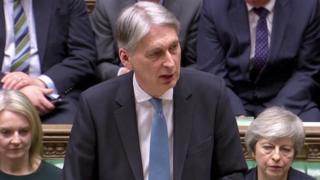 Image copyright
Reuters
Image copyright
Reuters
Chancellor Philip Hammond has signalled his backing for a cross-party consensus over Brexit, despite the PM still appearing to support her own deal.
He told MPs they had "a solemn duty in the days ahead to put aside our differences and seek a compromise".
It came after Theresa May said the UK could still leave the EU with a "good deal", despite MPs rejecting her plan.
Battling a sore throat, she said: "I may not have my own voice but I understand the voice of the country."
Jeremy Corbyn has called on the PM to change course after her deal was "decisively rejected" by 149 votes on Tuesday.
The Labour leader repeated his calls for Mrs May to "move on from her red lines" and suggested his alternative plan to remain in a customs union was "the only show in town".
The BBC's assistant political editor Norman Smith said the Chancellor's comments are likely to be seen as support for moves by senior cross-party MPs to forge an alternative Brexit agreement.
This could include holding a series of indicative votes on different options, which would show what next steps MPs would be prepared to back.
After Tuesday's defeat, the EU's chief negotiator, Michel Barnier, saying the bloc "cannot go any further" in trying to persuade MPs to back the agreed terms of exit and it was down to the UK to sort out.
This evening, MPs will vote on whether to block the UK from leaving the EU without an agreement later this month.
If the government motion passes, the block on no-deal would only apply to the 29 March deadline.
It wouldn't rule out the prospect of a no-deal exit later this year, if Parliament is ultimately unable to agree a way forward.
Two amendments have also been chosen by the Speaker John Bercow to be put to the Commons:
- Amendment (a) - put forward by Tory Caroline Spelman and Labour's Jack Dromey, which would remove the reference to 29 March and make it a straightforward rejection of no-deal
- Amendment (f) - known as the Malthouse Compromise, which includes terms for a "managed" no-deal, an extension of Brexit until 22 May and gives protection to citizens' rights
The prime minister has said she will vote to rule out a no-deal, but she has promised a "free vote" on the motion - meaning party bosses will not tell MPs which way to vote.
Chief Secretary to the Treasury, Liz Truss, has already said she will vote in the opposite way, telling BBC Two's Politics Live that a no-deal Brexit was not the "optimal scenario", but it had to be left on the table.
Delivering his Spring Statement to the Commons, Mr Hammond called on MPs across the Commons to "remove the threat of an imminent no deal exit hanging over our economy" in the voter later.
He said the uncertainty the possibility of a no-deal Brexit brought was damaging the UK economy, and the country's "standing and reputation in the world".
But the Chancellor then moved on to talk about a further vote that could take place on Thursday.
If MPs vote against a no deal later, the prime minister has said a motion would be tabled the following day allowing MPs to vote for an extension to Article 50 - the legal mechanism that sees the UK leaving the EU on 29 March.
Mr Hammond said: "Tomorrow [Thursday], we will have the opportunity to start to map out a way forward towards building a consensus across this House for a deal we can collectively support to exit the EU in an orderly way, to a future relationship that will allow Britain to flourish, protecting jobs and businesses."
He added that, while he had hoped MPs would reach a consensus during Tuesday's vote on Mrs May's deal, he was "confident that we, as a House, will do it over the coming weeks".
Is Hammond calling on May to sacrifice control?
The PM could compromise to get a hypothetical softer Brexit through the Commons - but days later find out that she could no longer govern.
In this febrile atmosphere when the Chancellor makes a call, as he has just done, to for a "consensus" across Parliament to find a way out of this hole, he is also hinting very publicly to the prime minister that it might be time now to think about making that sacrifice.
It's important to remember that Mr Hammond's preferred option all along has been to back the prime minister's deal, to try to get it through.
But a mild-sounding call for compromise just now, is not necessarily politically mild at all.
Asked after the statement if the Chancellor was setting out an alternative way forward from the prime minister, his spokeswoman insisted he "wasn't indicating directionality".
But when pushed, she added: "He's backed the deal up to now, the way forward will involve compromise.
"He believes compromise is the spirit in which we all have to try to find a way forward."
Jonathan Reynolds, Labour's shadow economic secretary, told Politics Live his "ears did prick up" when he heard the comments from Mr Hammond, and his party would welcome further talks with him.
"It appeared he was reaching out to some degree," he said. "If the government can't get their own MPs to back the deal, they have got to come to us.
"If there was a willingness from the Chancellor to talk about a long term future arrangement… yes, he can come and talk to us anytime."
But Liz Truss denied the Chancellor had given up on the prime minister's deal and was instead seeking a consensus with Labour on a softer Brexit.
"Philip Hammond doesn't give up," she said. "I don't believe he has given up on that."
